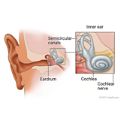Condition Basics
What is Ménière's disease?
Ménière's (say "men-YEERS") disease is an inner ear problem that affects your hearing and balance. It normally occurs in only one ear at a time. But over time, it develops in the other ear in up to half of those who have it.
The disease usually occurs in people ages 40 to 60, but anyone can have it.
What causes it?
The cause of Ménière's disease is not known. But it may be related to a fluid called endolymph in the inner ear. In people with Ménière's disease, too much of this fluid builds up. This creates pressure in the parts of your inner ear that control balance. Experts aren't sure why this fluid builds up. It may be that your body produces too much of the fluid. Or maybe the fluid doesn't drain as it should from the inner ear. Or it may be both.
It's hard to predict who will get Ménière's disease. But your risk may be higher than normal if you have:
- Another family member who has it.
- An autoimmune disease, such as diabetes, lupus, or rheumatoid arthritis.
- Had a head injury, especially if it involved your ear.
- Had a viral infection of the inner ear.
- Allergies.
What are the symptoms?
Ménière's disease can cause symptoms that come on quickly and last from hours to days. During an attack, you may have:
- Vertigo, the feeling that you or your surroundings are spinning. This may last from minutes to hours. It may be bad enough to cause nausea and vomiting.
- Tinnitus, a low roaring, ringing, or hissing in your ear.
- Hearing loss, which may be temporary or permanent.
- A feeling of pressure or fullness in your ear.
Most people have repeated attacks over a period of years. Attacks usually happen more often during the first few years of the disease and then come less often after that.
In some cases, each attack damages the inner ear. Over time your inner ear may become so badly damaged that it no longer works as it should. Then the attacks may stop, but you may be left with:
- Poor balance.
- Permanent hearing loss.
- Roaring or hissing in the affected ear.
A few people with Ménière's disease have "drop attacks." A drop attack is a sudden fall while you stand or walk. It occurs without warning. It may feel like you are suddenly being pushed to the ground. People who have these attacks don't pass out, and they recover within seconds or minutes.
See a doctor right away if you think you have Ménière's disease. Prompt diagnosis and treatment may reduce both the discomfort of the attacks and your risk of hearing loss.
How is it diagnosed?
Your doctor will do a physical exam that includes checking your ears, eyes, and nervous system. They'll also ask about your past health and your symptoms, including:
- Details about your vertigo attacks.
- Whether you have other symptoms like hearing loss, tinnitus, and ear fullness.
You will probably have a hearing test. Other tests, such as an MRI or a CT scan, may be done to help find out what is causing your symptoms.
How is Ménière's disease treated?
Ménière's disease can't be cured. But you can work with your doctor to find ways to decrease your symptoms and reduce how often you have attacks. Certain lifestyle changes like limiting sodium in your diet and reducing stress may help.
Medicines
Your doctor may prescribe a diuretic medicine. Diuretics help rid your body of excess fluid, so they may help prevent the buildup of fluid in your inner ear. And that may mean you have fewer attacks.
Your doctor may also prescribe medicines to use when you have an attack, such as:
- Medicines that reduce the vertigo. These include antihistamines such as dimenhydrinate (for example, Dramamine), sedatives such as diazepam (for example, Valium), and the scopolamine patch (Transderm Scop).
- Medicines that reduce nausea and vomiting caused by vertigo. These are called antiemetics.
Other treatments
If symptoms are severe and don't respond to medicine, your doctor may suggest another treatment. This may include a steroid injection into the inner ear to reduce the fluid or pressure in the inner ear. The goal is to get rid of your symptoms while saving as much of your hearing as possible.
In rare cases of severe, lasting Ménière's disease, doctors may suggest a treatment to destroy the balance center in the inner ear (labyrinth), which can prevent vertigo. Options include:
- Chemical ablation. During this procedure, an antibiotic (usually gentamicin) is injected into the inner ear to destroy the labyrinth.
- Surgery to remove the labyrinth. This is called labyrinthectomy.
These treatments can cause permanent hearing loss, so they are usually done only as a last resort.
What can you do at home?
Ménière's can be hard to manage and tough to live with. But there are some things you can do that may help reduce the number of attacks you have:
- Eat low-salt foods. Salt makes your body hold on to excess fluid. If you eat less salt, you may have less buildup of fluid in the ear. So you may get vertigo less often.
- Avoid caffeine, alcohol, and tobacco.
- Try to reduce the stress in your life.
To reduce your symptoms when you have an attack:
- Lie down and hold your head very still until the attack goes away.
- Take your medicines for vertigo and nausea as soon as you can.
You can also take steps to help protect yourself when you have attacks:
- Do exercises to improve your balance. This can reduce your risk of falling and hurting yourself or others.
- Make changes to reduce your risk of injury during a vertigo attack. For example, install grab bars in your bathroom. Wear shoes with low heels and nonslip soles. And don't drive during an attack.
